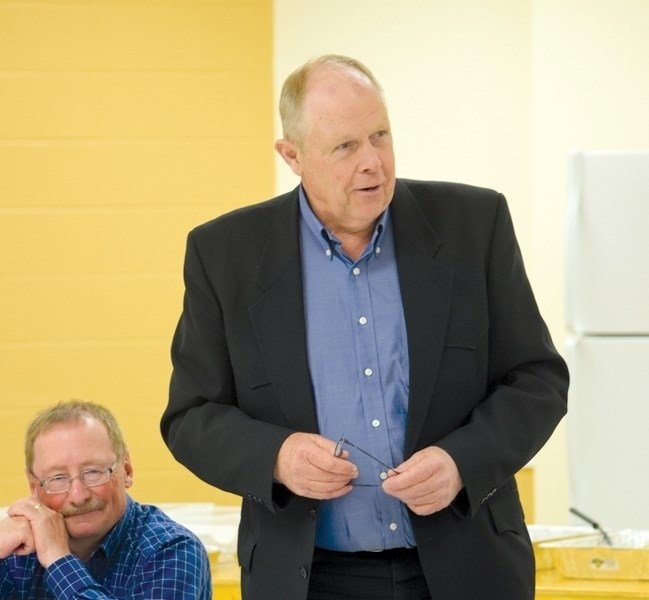The Barrhead business community gave Joe Ceci, finance minister for Alberta, a warm reception for his explanation of the 2016 provincial budget on Thursday, April 21, but that didn’t necessarily mean they agree with it.
After a 20-minute speech explaining the details and rationale behind this year’s budget, Ceci took questions from the audience.
Bill Lee, County of Barrhead’s reeve, kicked-off, congratulating Ceci on his government’s efforts to supporting pipelines, innovation and technology, increase FCSS funding and for putting Highway 661 on the province’s three-year capital plan.
“All of that is very much appreciated, but I have a concern about casinos and the inequitable funding rural municipalities receive compared to cities,” he said, adding the county recently received a letter from his department saying the province was working on the issue.
Lee then asked what progress had been made.
Ceci said the finance department was focused on releasing the budget, and as a result, the file is not as far along as he would like.
One of the solutions Ceci is investigating is using gaming monies from Horse Racing Alberta (HRA) to rural community non-profits.
“Recently we signed a 10-year agreement and I negotiated down the amount that would be going to the HRA and I am thinking that might be a potential source of monies to help the rural casinos get more of a share,” he said, adding the department needs more time to investigate. “But if my thinking holds up, there could be a pot of money that we could redistribute to rurals.”
Gerry St. Pierre, Barrhead’s mayor, said provincial governments have a long history of downloading costs to municipalities, using the example of seniors’ lodging.
“You didn’t reinstate the grant-in-lieu of taxes for seniors’ housing that are owned by the provincial government,” he said. “While the $42,000 is a small amount compared to the provincial budget, it is a significant amount for us.”
St. Pierre also expressed his concern regarding the carbon tax.
“Municipalities do buy fuel. Is there any plan for compensation? Or is that going to be another example of downloading to the municipalities?” he asked.
Ceci responded saying he understood St. Pierre’s concerns and had the same ones when he was a Calgary city councillor.
“I fought long and hard against being downloaded on in Calgary, so I’m sensitive and appreciative of municipalities’ concerns. The carbon levy will be 100 per cent rebated back into the economy. It will go to lower- and-middle income consumers directly,” he said, adding about 60 per cent of Albertans will receive rebates. “The rest of the levy monies will be reinvested in renewable energy project across Alberta.”
Ceci explained municipalities would benefit from being able to access these programs.
Lane Lee of Barrhead Cleaners complimented the minister for lowering the small-business tax rate, but he too added his concerns about the carbon tax.
“You say 60 per cent is coming back to us, but I don’t like the government to be the middleman for my money,” he said. “I think you should have left it with us. I think we can use it better.”
Lane also questioned the wisdom of not making cuts to public service.
“The province is hurting, people are hurting and you leave one sector of the province not hurting at all,” he said. “I think it would be alright to have small reductions in education and healthcare, instead of us having to suffer to pay for that.”
Ceci used B.C. as an example of the positive impact a carbon tax can have, saying since they enacted the tax in 2008, B.C. has reduced the amount of fossil fuel they use.
“Putting a price on carbon is something that shifts people’s behavour because they become aware that they have to pay for it both at the pump and in terms of heating their homes,” he said.
In regards to the public service, Ceci said, 27,000 people are employed directly by the government and that is the second lowest number when compared to B.C. Saskatchewan and Ontario.
He added as public sector contracts come due, the government is confident they will be able to negotiate agreements with the unions that would benefit everyone.
“We know people want to be able to go to hospitals will they need it and send their children to schools and have a limited number of kids in the classrooms and at the same time be fiscally responsible, but it will take time to get expectations down and negotiate those contracts.”
A number of people, although they did not have questions, wanted Ceci to know that they were not optimistic about the future and the NDP’s budget.



